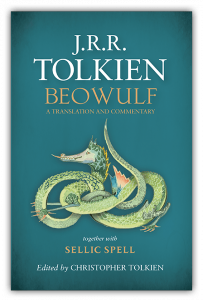May 22, 2014
Should J.R.R Tolkien’s translation of Beowulf be published?
by Martin Rouse
 Fans of J.R.R. Tolkien might know that his 1926 prose translation of Beowulf will be published by HarperCollins this week. They may also know that, in a letter to a friend, he described the translation as “hardly to my liking.” Chances are the fans will still want to read it.
Fans of J.R.R. Tolkien might know that his 1926 prose translation of Beowulf will be published by HarperCollins this week. They may also know that, in a letter to a friend, he described the translation as “hardly to my liking.” Chances are the fans will still want to read it.
This is the heart of the conflict surrounding the publication of Tolkien’s Beowulf: A Translation and a Commentary. As reported by The New York Times, the book will include Tolkien’s commentary on the text, as well as an as-of-yet unpublished story, “Sellic Spell,” which together serve to make it a particularly desirable volume for both scholars and fans. But, should we be reading it if Tolkien didn’t want us to?
A statement released by his son Christopher Tolkien—the book’s editor–confirms that Tolkien had “returned to [Beowulf] later to make hasty corrections, but seems never to have considered its publication.”
For some scholars, this is enough to damn the project altogether. “If Tolkien knew that was going to happen, he would have invented the shredder,” says Kevin Kiernan, English professor and Beowulf authority at the University of Kentucky. “Publishing the translation is a disservice to him, to his memory and his achievement as an artist.”
Certainly it is mortifying to have something of yours be read when you didn’t intend it to be. For some readers, it’s even a bit icky to think that a publisher would make money off a project in the way that a tabloid makes money off of unconsenting celebrities.
However, this translation of Beowulf has a lot more to offer than a tabloid photo. Tolkien’s 1936 essay “Beowulf: The Monsters and the Critics” places him as an important scholar of this work. And, as evidenced by our own Claire Kelley’s coverage of the nuances of Beowulf’s first line, this field of scholarship is very much alive. There is even some virtue to the incompleteness of this work, suggests The New York Times, as it offers “glimpses into [Tolkien’s] decision-making as he waded into gray areas of translation.”
When someone speaks of preserving an author’s legacy by denying access to his work, what they’re saying is that they don’t trust others to understand the work’s value. What they might not say, which is the true test of whether or not a work should impact an author’s legacy, is that they almost certainly wouldn’t deny access to themselves. In the case of this translation, the value would clearly be more straight-forward if it were Tolkien-approved, but it is undeniably there.
The ethics of publishing a work against an author’s will is a different matter. This is a gray area that has already been explored by publications such as TIME and The Guardian, and it is difficult to suggest any answers that are appropriate across the board. In light of the obvious merits of Tolkien’s Beowulf, however, I have faith that we are gaining more than we are losing.